News Summary
The One Big Beautiful Bill Act (OBBBA) unveils significant tax opportunities for contractors, including changes to income recognition, deductions, and depreciation rules. This legislation particularly benefits the construction industry, offering expanded exemptions for residential contracts, reinstating R&E expenditure deductions, and introducing new amortization rules. Furthermore, the act introduces a 100% bonus depreciation for select properties, alongside other tax benefits that promote immediate cash flow for businesses. Careful planning and professional guidance are advised to fully leverage these new provisions.
The One Big Beautiful Bill Act Introduces Key Tax Opportunities for Contractors
The new One Big Beautiful Bill Act (OBBBA) has opened the door to significant tax planning opportunities for contractors and businesses. This legislation brings important changes to income recognition, deductions, and depreciation rules which are expected to impact various sectors, particularly the construction industry.
Changes in Income Recognition for Contractors
With the OBBBA now enacted, contractors will experience notable adjustments to how they recognize income from long-term contracts and the related deductions. Under previous law, home construction contracts were exempted from using the percentage-of-completion method (PCM). This meant that home builders could select from a range of accounting methods, including the completed contract method or the accrual method.
Residential construction contracts, such as those related to apartment building, were particularly interesting as they had a split approach: 70% of the contracts required the PCM while 30% allowed any permissible method. The OBBBA has expanded the PCM exemption to include all residential construction contracts, applying to agreements made after the bill’s enactment date in 2026 for calendar year taxpayers.
Support for Research and Experimental Expenditures
Additionally, the OBBBA reinstates the ability for businesses to expense domestic research and experimental (R&E) expenditures for tax years beginning after December 31, 2024. This change is particularly beneficial for companies in the design-build space that invest heavily in innovation. Notably, unamortized Section 174 expenditures incurred between 2022 and 2024 can be deducted in 2025 or spread out over 2025 and 2026.
Small businesses with average annual gross receipts below $31 million for the year 2025 can file amended returns, enabling them to deduct prior years’ R&E expenditures.
Major Changes to Amortization and Deductions
The OBBBA also maintains the 15-year amortization period for foreign R&E expenditures but allows domestic expenditures to be amortized over a minimum of 60 months, starting when benefits are realized. Additionally, businesses will see the reinstatement of the add-back of depreciation, amortization, and depletion in calculating adjusted taxable income, increasing the cap on deductible business interest for tax years starting after December 31, 2024.
Furthermore, for property acquired after January 19, 2025, the OBBBA introduces a 100% bonus depreciation, while maintaining current phase-out rules for properties acquired prior to that date. A new deduction for overtime pay has also been introduced, allowing an above-the-line deduction of up to $12,500, which doubles to $25,000 for married couples filing jointly, phasing out at $150,000 or $300,000 of income.
Other Significant Provisions and Considerations
The OBBBA eliminates Section 179D deductions for energy-efficient commercial buildings after June 30, 2026, but it allows businesses to fully deduct qualifying equipment and property costs in the year they are purchased and placed in service. This provides significant immediate cash flow benefits.
The legislation raises the maximum deductible amount of business interest, enabling businesses to write off larger borrowing costs, while also making certain deductions for pass-through business owners permanent, thereby lowering effective tax rates on parts of business income.
Additionally, startups can enjoy enhanced benefits through expanded qualifying income under Section 1202 for sold small business stock. The OBBBA also repeals temporary moving expense deductions, with exceptions for members of the armed forces, and makes investment incentives for Qualified Opportunity Zones (QOZs) permanent.
Conclusion and Future Planning
The complexities and potential ripple effects of the OBBBA necessitate careful tax planning and strategic implementation by contractors and businesses. Working with a professional CPA can help businesses navigate the various changes and evaluate the best options under the new rules, ensuring they maximize available opportunities while remaining compliant with IRS requirements.
Deeper Dive: News & Info About This Topic
Additional Resources
- CLA Connect: What Contractors Need to Know About the One Big Beautiful Bill Act
- RSM: 5 Ways the One Big Beautiful Bill Act Could Help Your Company Save on Taxes
- Vinson & Elkins: One Big Beautiful Bill Act – Key Tax Impacts for Businesses
- Grant Thornton: New Law Brings in Significant Tax Changes
- Wikipedia: Tax Law
- Google Search: One Big Beautiful Bill Act
- Google Scholar: One Big Beautiful Bill Act
- Encyclopedia Britannica: One Big Beautiful Bill Act
- Google News: One Big Beautiful Bill Act
Author: Construction FL News
The FLORIDA STAFF WRITER represents the experienced team at constructionflnews.com, your go-to source for actionable local news and information in Florida and beyond. Specializing in "news you can use," we cover essential topics like product reviews for personal and business needs, local business directories, politics, real estate trends, neighborhood insights, and state news affecting the area—with deep expertise drawn from years of dedicated reporting and strong community input, including local press releases and business updates. We deliver top reporting on high-value events such as the Florida Build Expo, major infrastructure projects, and advancements in construction technology showcases. Our coverage extends to key organizations like the Associated Builders and Contractors of Florida and the Florida Home Builders Association, plus leading businesses in construction and legal services that power the local economy such as CMiC Global and Shutts & Bowen LLP. As part of the broader network, including constructioncanews.com, constructionnynews.com, and constructiontxnews.com, we provide comprehensive, credible insights into the dynamic construction landscape across multiple states.





